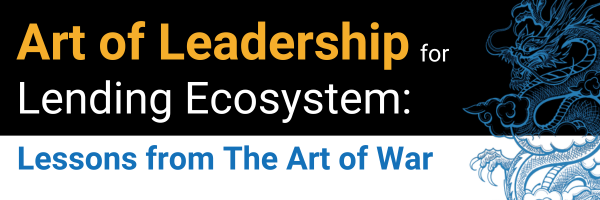

Winston Pinto
Head of Growth & Business
In the fast-paced, technology-driven landscape of today’s economy, businesses and individuals alike demand rapid, seamless access to credit. Traditional lending, with its manual processes and long waiting periods, has often failed to keep up with these needs. Enter automated lending—an innovation that has transformed the way financial services are delivered. Automated lending uses cutting-edge technology to streamline the loan process, from application to disbursement, ensuring faster approvals, reduced risks, and greater accessibility.
Here are key leadership lessons from The Art of War that resonate with leaders navigating the lending ecosystem:
1. Know Your Market, Know Your Business
Sun Tzu’s advice to “know your enemy and know yourself” is directly applicable to the lending space. In this case, the "enemy" isn’t just your competitors; it’s also market risks, regulatory pressures, and evolving customer expectations. Knowing your strengths as a lender—whether it’s speed, innovative products, or customer service—while also understanding the broader market allows you to remain competitive and strategically navigate challenges.
Application for Leaders:
-
Continuously assess your organisation’s risk profile, strengths, and weaknesses in loan origination, disbursement, and portfolio management.
-
Understand the creditworthiness and behaviour of your borrowers using data-driven insights.
-
Stay abreast of market changes, interest rate trends, and regulatory updates to adjust your lending strategies accordingly.
-
Know your competition—not just other lenders, but fintech disruptors and alternative credit providers that could alter the landscape.
2. Adaptability Is Key
Sun Tzu taught that “In the midst of chaos, there is also opportunity.” In the lending ecosystem, the ability to pivot and adapt to new challenges—whether it’s changing regulatory requirements, market downturns, or shifts in borrower behavior—is critical. An agile leader who can make quick, informed decisions will keep the organisation resilient and competitive, even in uncertain times.
Application for Leaders:
-
Be prepared to pivot your lending criteria and risk appetite based on economic conditions. For instance, during a downturn, focusing on secured loans might reduce exposure to defaults.
-
Encourage innovation by integrating AI and machine learning for more accurate credit risk assessments and faster loan processing.
-
Use real-time data and analytics to adjust credit policies and product offerings based on borrower needs and financial trends.
-
Maintain an agile workforce and tech infrastructure that can quickly adapt to new regulations or emerging technologies.
3. Lead with Vision and Integrity
Sun Tzu’s statement, “A leader leads by example, not by force,” emphasises the importance of integrity and vision in leadership. In lending, trust is fundamental—whether it’s trust between lenders and borrowers, or lenders and regulators. Leaders must embody transparency, ethical practices, and a clear vision for sustainable growth, ensuring that their teams are aligned with long-term goals while maintaining compliance and customer trust.
Application for Leaders:
-
Foster a culture of trust within your organisation and with your borrowers by ensuring transparent lending terms, ethical underwriting practices, and fair customer service.
-
Define a clear strategic vision for your lending institution, whether it’s focused on digital transformation, expanding your loan portfolio, or entering new markets.
-
Model ethical leadership in regulatory compliance, ensuring that all loan practices meet or exceed legal standards.
-
Encourage customer-centricity by designing loan products that truly meet the needs of SMEs, individuals, or underserved segments, while balancing profitability with responsibility.
4. Building Strategic Partnerships
In The Art of War, Sun Tzu emphasises the importance of alliances: “The power of one may be strong, but the power of many is stronger.” In the lending ecosystem, partnerships can be a game-changer—whether it’s with fintech companies, other financial institutions, or credit rating agencies. Strategic alliances allow lenders to tap into new markets, access advanced technologies, or enhance their credit evaluation processes, giving them a competitive edge.
Application for Leaders:
-
Form partnerships with fintechs to leverage AI, machine learning, and alternative data for more accurate and faster credit risk assessments.
-
Collaborate with credit bureaus and other financial institutions to share insights on borrower creditworthiness and market trends.
-
Build alliances with non-banking financial companies (NBFCs) and microfinance institutions to reach underserved markets or expand your lending footprint.
-
Invest in technology platforms that integrate seamlessly with third-party service providers, ensuring smooth loan origination, disbursement, and servicing.
5. Win Without Fighting: Focus on the Long Game
Sun Tzu famously stated, “The greatest victory is that which requires no battle.” In lending, this can be interpreted as the importance of strategic foresight—anticipating future challenges and opportunities, and positioning your organisation to succeed without needing to engage in costly market battles. By focusing on sustainability, customer loyalty, and risk management, leaders can achieve long-term success without the need for aggressive short-term tactics.
Application for Leaders:
-
Build long-term customer relationships by offering personalised loan products, flexible repayment options, and loyalty benefits.
-
Focus on risk management and portfolio diversification to ensure stability even in volatile markets.
-
Emphasise customer retention over acquisition by creating value-added services like financial education, better loan management tools, and refinancing options.
-
Think ahead and invest in technologies or business models that will future-proof your lending business, whether it’s blockchain for secure transactions or AI for predictive analytics.
Conclusion: Mastering Leadership in Lending
The principles in The Art of War remind us that leadership is not just about short-term victories, but about sustainability, adaptability, and strategic foresight. In the lending ecosystem, where risks and opportunities constantly evolve, leaders who understand their market, adapt to change, lead with integrity, form strategic partnerships, and think long-term are more likely to thrive. By applying Sun Tzu’s wisdom, today’s lending leaders can craft a strategy that ensures not only survival, but sustained success in a highly competitive industry.